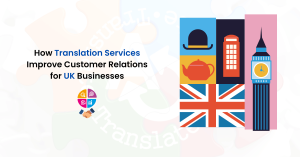In today’s globalised, interconnected world, the ability to communicate effectively across linguistic and cultural boundaries has become paramount for businesses seeking to thrive in the international marketplace. For the United Kingdom (UK), a nation renowned for its diverse cultural heritage and pivotal role in global affairs, translation services have emerged as a vital tool in fostering stronger customer relationships and driving business success.
This comprehensive article delves into the multifaceted benefits that translation services offer to UK enterprises, shedding light on how they can leverage these services to expand their reach, strengthen partnerships, ensure regulatory compliance, and ultimately, deliver exceptional customer experiences. By exploring real-world case studies and analyzing the nuances of this dynamic industry, we will uncover the transformative power of translation services in the UK’s business landscape.
The Changing World of Translation Services in the UK
The need for translation services in the UK has grown significantly in recent years. This growth is due to the country’s diverse population and its role as a global business center. As the world becomes more connected, being able to bridge language barriers has become crucial for businesses.
1. Supporting Multilingualism in the UK
The UK’s diverse society, with people from many cultural and linguistic backgrounds, highlights the importance of translation services. These services help individuals access information, services, and resources in their own languages, promoting inclusion and social harmony.
2. Boost in Global Trade and Cooperation
The UK’s position as a global business hub means translation services are essential for smooth communication with international partners, clients, and customers. Businesses that use these services can handle cross-border deals, meet regulatory requirements, and understand cultural differences better, giving them a competitive advantage.
3. Advancements in Translation Technology
The translation industry has seen significant changes with new technologies like machine learning, artificial intelligence, and cloud-based platforms. These technologies have improved the speed and accuracy of translations and opened up new ways for personalized and context-aware communication, making translation services even more valuable for UK businesses.
Empowering UK Businesses to Reach Global Audiences
Change this in simple words to read easily and change headings also but meaning remain same of everything
1. Bridging the Language Gap in Negotiations and Contracts
Complex negotiations and contractual agreements often involve intricate legal and technical terminology, which can pose significant challenges for businesses operating across linguistic boundaries. Translation services provide the necessary expertise to ensure that all parties involved have a clear understanding of the terms and conditions, mitigating the risk of misunderstandings and disputes.
2. Fostering Cross-Cultural Understanding
Successful partnerships often hinge on the ability to navigate cultural nuances and preferences. Translation services in the UK can play a vital role in bridging these cultural divides, enabling businesses to communicate effectively, demonstrate cultural sensitivity, and build stronger, more cohesive relationships with their international counterparts.
3. Streamlining Regulatory Compliance
In the realm of global business, adhering to various legal and regulatory frameworks can be a daunting task. Translation services act as crucial allies, ensuring that UK companies can accurately translate and submit the necessary documentation, avoiding potential legal entanglements and strengthening their standing with regulatory bodies.
Improving Customer Experiences with Multilingual Support
Translation services help UK businesses improve customer experiences by offering support and resources in multiple languages. This boosts customer satisfaction, brand loyalty, and positive word-of-mouth.
1. Empowering Customers with Multilingual Content
Providing product information, user manuals, and support materials in different languages helps customers fully understand and use your products. This makes the customer experience better, reduces frustration, and increases satisfaction.
2. Personalized Customer Service in Multiple Languages
Offering personalized customer service in a customer’s preferred language can set a business apart. Translation services allow UK businesses to provide seamless, high-quality support, building stronger relationships and enhancing customer loyalty.
3. Making Products and Services Accessible to All
The UK’s diverse society means businesses need to be inclusive. Translation services ensure that products, services, and communications are accessible to a wide range of customers, regardless of their language, promoting inclusivity and expanding the customer base.
4. Ensuring Legal Compliance and Transparency
In global business, following legal rules and being clear about regulations is crucial. UK translation services help companies manage these complexities, ensuring compliance and transparency.
Navigating the Evolving Landscape of Translation Services
As the demand for translation services in the UK continues to grow, businesses must stay abreast of the latest trends and best practices to maximise the benefits of these services.
1. Leveraging Technological Advancements
The translation services industry has experienced a technological revolution, with the integration of machine learning, artificial intelligence, and cloud-based platforms. UK businesses should stay informed about these advancements and explore how they can leverage these tools to enhance the speed, accuracy, and personalisation of their translations.
2. Prioritising Quality and Linguistic Expertise
While technological innovations have transformed the translation services landscape, the expertise and cultural understanding of human linguists remain crucial. UK businesses should prioritise working with translation providers that can deliver high-quality, context-sensitive translations, ensuring that their communication and content resonate with target audiences.
3. Developing Comprehensive Translation Strategies
To fully harness the power of translation services, UK businesses should adopt a strategic, holistic approach. This may involve conducting thorough market research, identifying key linguistic markets, and developing a comprehensive plan to integrate translation services across various business functions, from marketing and customer service to legal and HR.
Conclusion
In the interconnected, globalised world of today, translation services have emerged as a powerful enabler for UK businesses, empowering them to expand their reach, strengthen partnerships, enhance customer experiences, and elevate their brand reputation. By leveraging the transformative potential of these services, UK enterprises can position themselves for long-term success, navigating the challenges of a multilingual marketplace and capitalising on the vast opportunities that lie beyond their domestic borders.
As the demand for translation services continues to grow, UK businesses must stay attuned to the latest trends and best practices, leveraging cutting-edge technologies while prioritising quality and linguistic expertise. By doing so, they can uncover new avenues for growth, foster deeper connections with customers and partners, and solidify their status as global leaders in their respective industries.








